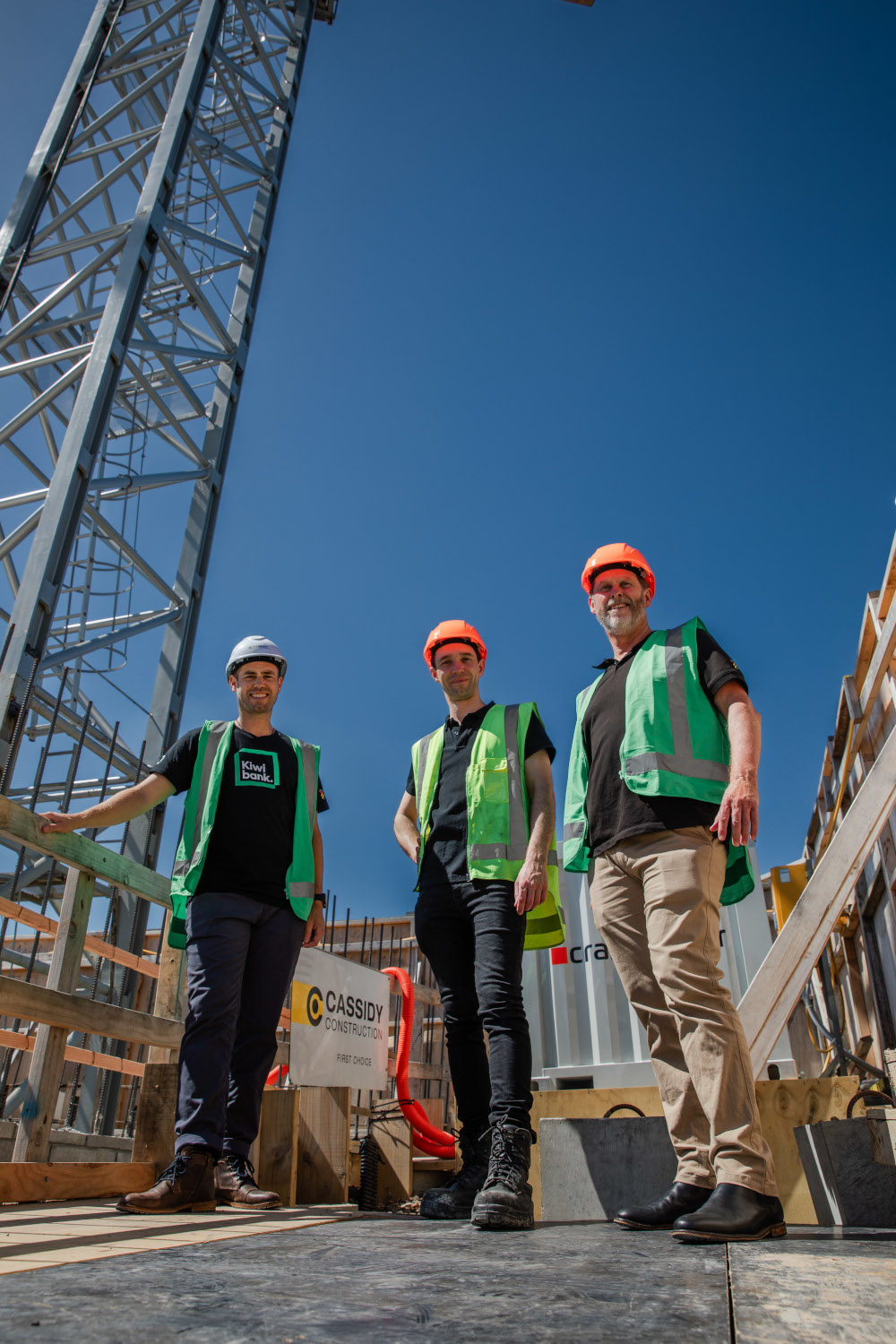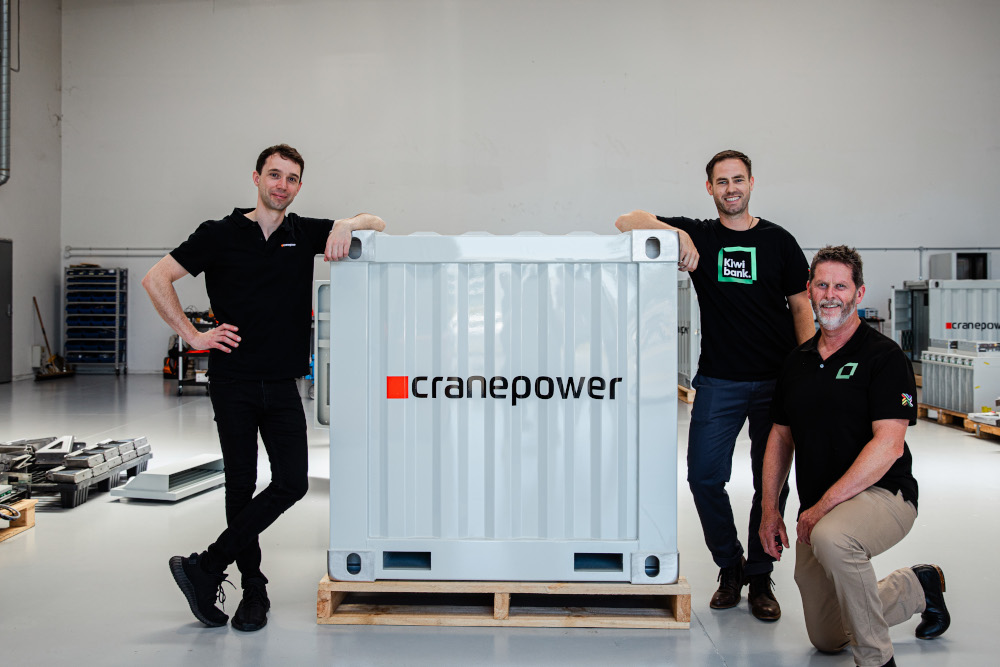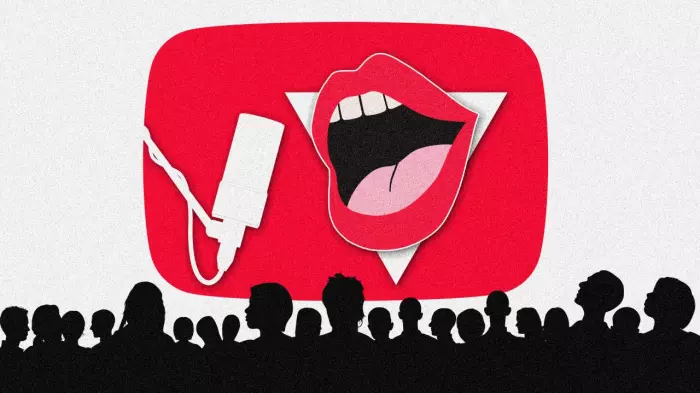Battery-powered invention set to change the world of tower cranes - and the environment.
When we look at those tower cranes populating the city, we often see giant construction devices belching diesel fumes into that same skyline.
However, Tom Williams, Kiwibank’s Head of Sustainable Finance, now sees a different picture. He sees a world-leading technology, a new high-value export and, as befits the head of a bank’s sustainable finance operation, a big win for the environment.
That’s because Williams and Kiwibank are backing Elliot Peacocke and his Cranepower company, an engineer who has invented a battery-powered, clean, quiet and sustainable power pack for cranes, with no further need for diesel power or large transformers.
It’s a breakthrough that has Williams excited at the export and environmental potential and he is also fizzing about Kiwibank’s role in such ventures.
 To understand the potential, you need to know there are about 100,000 tower cranes round the world – many diesel-powered but some electric (though powered from the grid). Cranepower’s innovation, clear commercial purpose and sustainability caught Kiwibank’s attention – and Williams points out there are around 1000 tower cranes at work in New Zealand and Australia at any one time, most across the Tasman.
To understand the potential, you need to know there are about 100,000 tower cranes round the world – many diesel-powered but some electric (though powered from the grid). Cranepower’s innovation, clear commercial purpose and sustainability caught Kiwibank’s attention – and Williams points out there are around 1000 tower cranes at work in New Zealand and Australia at any one time, most across the Tasman.
“If we can help him get into that market, get more of these units out there, not only does it help them scale up and prove the technology, but every single one of his units that go around Australia, around New Zealand, are reducing diesel consumption, reducing emissions and reducing noise.
“That's a good outcome for everyone near the construction site and it's a good outcome for the Kiwi economy because we've got a high-value high-tech product being exported,” he says.
“New Zealand needs to grow high-value export products. We can't rely on what we've done in the past as we look to the future. We need more businesses that might be creating new software or creating a new product like Elliot has, that the world is going to need - and can help fuel the Kiwi economy and the next generations.”
 Kiwibank is in the business of backing innovation and “we’re really supportive of all business big and small, but really love those businesses that have a new idea, who are purpose driven and are looking to add value or lead change.”
Kiwibank is in the business of backing innovation and “we’re really supportive of all business big and small, but really love those businesses that have a new idea, who are purpose driven and are looking to add value or lead change.”
Smith Cranes, the country’s largest crane company, jumped at the opportunity to buy the first machine. Cranepower rents CP-300 crane UPS units as an alternative to diesel generators in New Zealand and, in Australia, has units on the ground already, with many more projects seriously considering using his machines.
Next stop, the world, says Peacocke. “The total addressable market for our existing product is somewhere around $US3 billion and we're the only people making them at the moment.”
There’s a challenge. Global construction companies know only two ways to power tower cranes: a huge transformer connected to mains power or a large diesel generator.
“We're having to educate construction companies about this new third option and it's taking time for people to get comfortable with it,” Peacocke says. “We think that will grow exponentially as larger players start using our machine.”
Benefits, he says, are obvious and wider than commercial considerations. “We have a triple whammy packed with our product. I'm always a fan of products or solutions that tick all the boxes - often there's these so-called ‘green solutions’ which are not very practical and don't stack up commercially.
“Our option is much easier, smaller and quieter to use; it's much cheaper because you don't have to keep filling the generator with diesel and you don't have to spend hundreds of thousands to put in a transformer.
“Environmentally, it's much better than burning a whole bunch of diesel. One of our machines can save up to 200 tonnes per year of CO2, which is the equivalent of around 100 EVs on the road.”
Peacocke used to rent out old-school generators to companies, including crane operators, but had an idea while working alongside the Rocket Lab team and built the prototype.
“I saw that tower cranes use a whole lot of power for very short periods, so you end up running these large diesel generators all day long, just waiting for little spikes of power. It struck me as being really inefficient; I thought there must be a better way to do it, with batteries.”
As history has often proven, many good ideas never come to fruition but Peacocke was able to pique Kiwibank’s interest. Williams says: “This is true Kiwi ingenuity - having an idea, going about solving it and then building it. What Elliot wanted was to make something better than what was there before and for everyone to get on board with that.”
In 2014, Peacocke started Nukor to import, sell, rent and service diesel generators and industrial air compressors. In 2015 he began working alongside Rocket Lab when Nukor was contracted to build the power system for Rocket Lab’s Mahia launch site. In 2021, Peacocke returned to his idea of creating a battery alternative to fossil fuel generators.
“There are over 100,000 tower cranes in operation around the world and providing power to them is getting harder and harder for construction companies. National grids are under more and more strain, diesel prices are going through the roof and there’s ESG pressure.
“Everything reached a point where I thought, ‘this is a great idea and I want to commercialise it’. I sold Nukor in 2021 and put all the money and all my time into Cranepower.”
Peacocke says the relationship with Kiwibank throughout Cranepower’s short history has been crucial. “Kiwibank have been really supportive since day one. For instance, they helped us to finance our rental assets - they went out on a limb because they were a new kind of asset and they weren't really sure what the demand was like. That they could see the obvious benefits of the product and went, yep, we're going to support this, has been a huge help.”
Williams says the strength of the relationship between Cranepower and Kiwibank is that they’ve been together from the outset
“Right from the start, when Elliot was creating his concept, he formed a relationship with two business bankers in particular. They’ve been with him all the way. Knowing your banker really does matter in business banking.
Watch the full episode in Kiwibank's series, Business for Better, and learn more about how Cranepower are leading the way in how they do business for better www.kiwibank.co.nz/businessforbetter. This article was proudly brought to you by Kiwibank, who believe sustainability and profitability go hand-in-hand when creating a future proof business. That's why Kiwibank support Kiwi businesses making a positive impact on the environment, their customers and their employees. This is business banking for better #ThisisKiwi.
Watch here:





